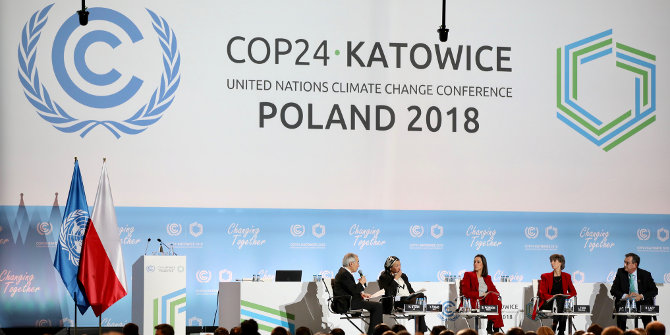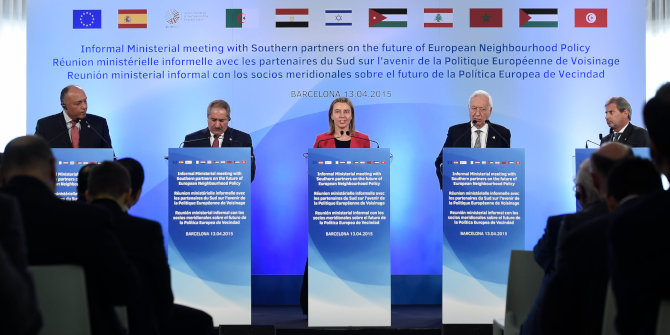
 The United Nations climate conference held in Katowice (COP24) earlier this month produced a deal on implementing the Paris climate agreement. But what role did the EU have in the negotiations? Charles F. Parker and Christer Karlsson explain that in the absence of a constructive approach from the United States, the EU sought to provide leadership by working together with China and other partners. However, while these efforts paid off in Katowice, significant challenges still lie ahead for EU climate leadership and the Paris Agreement.
The United Nations climate conference held in Katowice (COP24) earlier this month produced a deal on implementing the Paris climate agreement. But what role did the EU have in the negotiations? Charles F. Parker and Christer Karlsson explain that in the absence of a constructive approach from the United States, the EU sought to provide leadership by working together with China and other partners. However, while these efforts paid off in Katowice, significant challenges still lie ahead for EU climate leadership and the Paris Agreement.
After two weeks of diplomatic wrangling, negotiators at the UN climate conference in Katowice (COP24) succeeded in adopting a ‘rulebook’ that makes the landmark 2015 Paris Agreement into a functioning international climate regime. The ‘Katowice Climate Package’ creates a process and a roadmap that aims to deliver on the Paris objectives of holding global warming to well below 2°C while pursuing efforts to limit it to 1.5°C.
After the jubilation that greeted the successful negotiation of the Paris Agreement and the momentum created by its early entry into force in 2016, international climate cooperation and multilateralism in general have faced stiff political headwinds. In June 2017, as discussed in a previous article and blog post, President Donald Trump announced his intention to withdraw the United States from the Paris Agreement. Global carbon emissions have risen. There is a substantial gap between the climate actions countries are taking and what science says is needed to avoid the worst impacts of climate change. The negotiations leading up to COP24 were contentious and disagreements between the developed and developing countries over universal rules for mitigation and transparency as well as financing levels threatened to scuttle a strong agreement in Katowice.
Leadership would be needed to produce a substantively and symbolically strong rulebook and, prior to COP24, the EU stated its intention to ‘lead the way’ in the pursuit of comprehensive and robust provisions to implement the accord. But what role did the EU actually play in the COP24 outcome and to what extent did EU leadership deliver in Katowice?
EU climate leadership?
Miguel Arias Caňete, the European Commissioner for Climate Action and Energy, pronounced the outcome in Katowice as ‘a success for multilateralism and the global fight against climate change’. While acknowledging that more work remains to be done, he argued that COP24 was a major milestone in transforming the Paris Agreement from words into concrete action. In the immediate aftermath of the Katowice summit, Caňete took credit for the deal declaring that the ‘EU played an instrumental role in reaching this outcome’ and he also emphasised that the ‘EU will continue to lead’ going forward. The question is: do these proud declarations square with reality?
In the last two decades the EU has actively promoted itself as a global leader on climate change. Elsewhere we have examined how successful the EU has been in realising its bid for climate change leadership. We have found a fragmented leadership landscape where the EU has been forced to adjust its leadership strategies in relation to other key players such as the US and China.

Credit: Kaia Rose, Connect4Climate (CC BY-NC-SA 2.0)
In a recent study and blog post, looking specifically at COP21, we found that the EU played an important role in shaping the successful outcome in Paris. But it did so by forging a leadership alliance with the US and China, who were the primary architects of the accord’s institutional design, and by combining different leadership strategies to achieve its goal of an ambitious deal where pledges would be updated and reviewed in recurring five year cycles.
The EU’s main objective in Katowice was to ensure that the negotiations delivered a rulebook that was ‘ambitious, clear and comprehensive’ and that was ‘in line with the spirit and letter of the Paris Agreement’. To demonstrate its commitment to leading by example, the EU presented its plans for a climate-neutral Europe by 2050 in advance of COP24 and highlighted that it was the largest donor of climate finance to developing countries. As part of its idea-based leadership the EU Council announced it was ‘deeply concerned’ by the evidence concerning the negative impacts of climate change presented by the IPCC’s latest report and the EU promoted its vision for measures covering mitigation, transparency, review, and how to promote compliance.
The EU also worked at being an instrumental leader in Katowice. Past experiences have proved the importance of forging leadership alliances with other key players in order to effectively broker solutions to tricky negotiation problems. In contrast to COP21, where the US played a constructive role and cooperated with the EU on issues such as transparency, the EU would need to fill the leadership void created by Trump’s plan to withdraw the US from the Paris Agreement by working together with China and finding partners like Canada and the High Ambition Coalition that shared its vision for an ambitious deal and joined the EU in calling for governments to step up their ambition through enhanced mitigation pledges.
The EU gets what it needs but internal and external challenges loom
One of the most important tests for EU leadership in Katowice was whether it could help secure an outcome with uniform and universal rules for all countries or if the deal would contain different rules for developed and developing countries thereby reintroducing ‘bifurcation’ into how the Paris Agreement would operate in practice. This was a potential fault line between the EU and China and it was unclear if they could reach a common position. As negotiations wound down, the investment the EU made in creating a leadership alliance with China paid off when China shifted its position towards the EU’s vision. As a result, the final deal largely has uniform rules for all countries, albeit with a great degree of flexibility for those that lack the capacity to meet them.
In the final analysis, the EU can be pleased that the agreed rulebook puts in place a system of transparency, a system of reporting, rules to measure emissions, a system to judge the impacts of policies compared to what science recommends, and an implementation and compliance committee with some teeth. Moreover, the rules contained in the final package are relatively strong and the final rulebook text uses the legally-binding language of ‘shall’ in 260 places, compared to 110 uses of the weaker ‘should’ formulation.
To make the Paris Agreement work going forward, continued EU leadership will be necessary; however, to do so it must overcome internal and external challenges. The EU will need to maintain internal cohesion and continue to meet its own ambitious climate goals. This could prove difficult with the problem of Brexit still unresolved, an ongoing political crisis in France that was triggered by the Macron government’s modest fuel tax, Germany’s struggle to phase out coal, and rising populism across Europe.
Effective leadership demands credibility and the ability to convince prospective followers that one is acting on behalf of the common good. To date, the EU has not convinced enough governments around the world to match its ambitious climate goals. Although the diplomatic process is moving forward and making progress, it is not delivering climate action of sufficient speed, scale, and scope commensurate with what science demands to adequately confront the threat of dangerous climate change. A UN Secretary General’s climate summit in the fall of 2019 which aims to raise ambition and mobilise additional resources, COP25 next year in Chile, and, of particular importance, the new round of climate pledges which are due in advance of COP26 in 2020 will be the next big tests for EU leadership and the Paris Agreement.
Please read our comments policy before commenting.
Note: This article gives the views of the authors, and not the position of EUROPP – European Politics and Policy, nor of the London School of Economics.
_________________________________
 Charles F. Parker – Uppsala University
Charles F. Parker – Uppsala University
Charles F. Parker is Associate Professor of Political Science at the Department of Government and serves as the deputy chair of the board for the Centre for Natural Hazards and Disaster Science (CNDS) at Uppsala University in Sweden. His research has focused on climate change politics, leadership, crisis management, and the origins and consequences of warning-response problems. His most recent publication is ‘The effectiveness of national and EU-level civil protection systems: Evidence from 17 member states’ in the Journal of European Public Policy. He tweets @Parker_CF
 Christer Karlsson – Uppsala University
Christer Karlsson – Uppsala University
Christer Karlsson is Professor of Political Science at the Department of Government, Uppsala University in Sweden. He has published books, articles and book chapters in his principal research areas: climate change politics, European Union studies, constitutional politics and democratic theory. His work has appeared in journals such as European Law Journal, Global Environmental Politics, Journal of European Public Policy and Journal of Common Market Studies. He is currently doing research on political opposition in EU politics.




